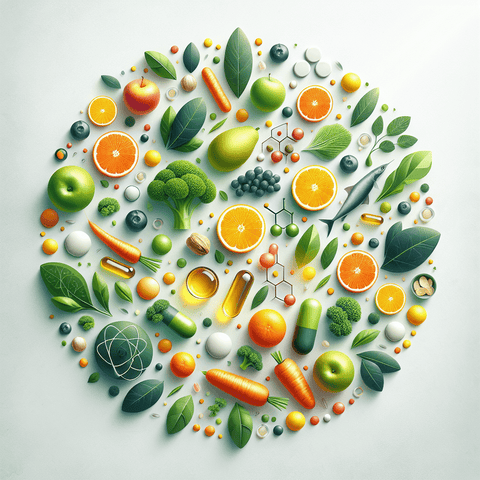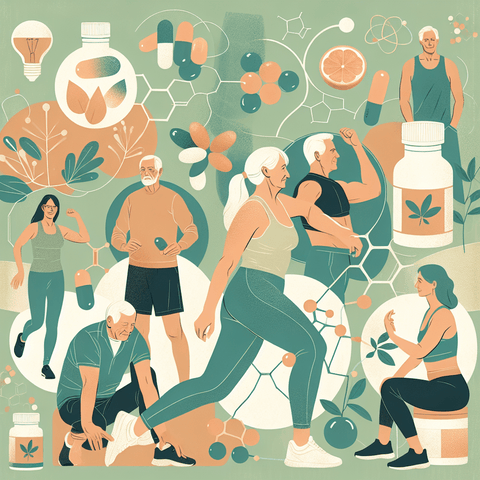Introduction
Vitamins are organic compounds that play critical roles in almost every physiological function in the human body. Although required in small amounts, they have an outsized impact on health and wellness. A well-balanced diet typically provides the necessary levels of vitamins, but in today’s fast-paced lifestyle, dietary supplements have become increasingly essential in maintaining optimal health. Supplements help bridge nutritional gaps, especially when dietary choices or health conditions make it difficult to obtain enough through food alone. Many people aren't fully aware of the complete list of essential vitamins nor their unique contributions to the body. Vitamins are integral to energy production, immune function, metabolism, bone health, skin condition, and cognitive support, among other roles. Since deficiencies can lead to significant health issues, it's crucial to understand what these 13 vitamins are, how they function, and where we can find them naturally. In this comprehensive guide, we’ll explore the 13 essential vitamins your body needs, explain the difference between water- and fat-soluble vitamins, and dive into the benefits, dietary sources, and potential deficiency symptoms of each one. Whether you're looking to improve your nutritional literacy or make informed choices about supplements, this article has you covered.Vitamins Relevant to Nutritional Supplements
Nutritional supplements have become a staple in modern health routines, especially for individuals who face challenges meeting daily vitamin requirements through food alone. Certain vitamins are more commonly supplemented than others, largely owing to how difficult they are to obtain from diet or maintain in sufficient levels in the body. For instance, vitamin D doesn't exist in large quantities in many foods and primarily depends on sun exposure for synthesis, making supplementation crucial in regions with limited sunlight. Likewise, vitamin B12, found mainly in animal-derived foods, may be lacking in vegetarian or vegan diets—necessitating a supplement for adequate intake. Multivitamins generally include several or all of the 13 essential vitamins, often balanced to cover the Recommended Daily Allowance (RDA) or Adequate Intake (AI) as advised by health authorities. Some formulations also target specific populations, like prenatal supplements rich in folate (vitamin B9) or immune-boosting blends that include vitamin C and vitamin D. High-quality supplement categories like [vitamin C for immunity and antioxidant support](https://www.topvitamine.com/collections/vitamin-c-benefits-immunity-antioxidant-energy) and [vitamin D for bone and calcium metabolism](https://www.topvitamine.com/collections/vitamin-d-benefits-sources-safety) are some popular examples of essential vitamin supplementation. The rise in chronic stress, poor diet, and environmental toxins also contributes to increased depletion or demand for essential nutrients. Proper supplementation, when necessary and backed by professional guidance, can be a cornerstone of preventative health. However, it’s important that individuals choose supplements that are scientifically formulated and subject to strict quality control.Vitamin Classification: Water-Soluble vs. Fat-Soluble Vitamins
Vitamins fall into two major categories: water-soluble and fat-soluble. This classification significantly affects how our bodies absorb, store, and eliminate these nutrients. Water-soluble vitamins include the B-complex group (B1, B2, B3, B5, B6, B7, B9, and B12) and vitamin C. These dissolve in water and are not stored in significant amounts in the body. Because they are flushed out via urine, regular intake through diet or supplements is essential. Overdosing is generally less of a concern, although excessive quantities of certain water-soluble vitamins can still pose issues. Fat-soluble vitamins—A, D, E, and K—require dietary fats for proper absorption. They are stored in the liver and fatty tissues, allowing the body to draw on these reserves over time. However, this also means there is an increased risk of accumulation and toxicity if taken in excess. Here is a breakdown of the classifications: Water-Soluble Vitamins: - Vitamin B1 (Thiamine) - Vitamin B2 (Riboflavin) - Vitamin B3 (Niacin) - Vitamin B5 (Pantothenic Acid) - Vitamin B6 (Pyridoxine) - Vitamin B7 (Biotin) - Vitamin B9 (Folate) - Vitamin B12 (Cobalamin) - Vitamin C (Ascorbic Acid) Fat-Soluble Vitamins: - Vitamin A - Vitamin D - Vitamin E - Vitamin K Understanding how vitamins behave in the body highlights why consistent intake, especially of water-soluble vitamins, is crucial. Likewise, with fat-soluble vitamins, awareness of safe upper intake levels is essential, especially when taking supplements.Vitamin Functions: How Vitamins Support Our Body
Vitamins orchestrate a wide variety of bodily functions by supporting enzyme function, acting as antioxidants, or playing structural roles in cellular maintenance. Each vitamin fulfills specific biological tasks that are crucial for maintaining health and vitality. For example, vitamins B1, B2, B3, B5, B6, B7, B9, and B12 support metabolism, helping your body convert food into usable energy. They also contribute to nerve function, skin health, and red blood cell production. Vitamin C is a powerful antioxidant that boosts the immune system and aids in collagen formation, which is essential for skin, cartilage, and wound healing. Fat-soluble vitamins have distinct roles. Vitamin A supports vision and cell growth; vitamin D enhances calcium absorption for healthy bones and teeth; vitamin E acts as an antioxidant protecting cells from oxidative stress; vitamin K is essential for blood clotting and also supports bone health. Check out available [vitamin K supplements](https://www.topvitamine.com/collections/vitamin-k-benefits-bone-blood-health) for options that contribute to normal blood health and bone maintenance. Vitamin deficiencies can lead to severe health consequences. For instance, inadequate vitamin D can affect bone integrity, while a lack of B12 can compromise neurological health. On the other hand, excessive vitamin intake—particularly fat-soluble kinds—can result in toxicity if taken improperly. Balanced vitamin levels support not just physical health but also mental well-being, illustrating just how interconnected nutrition is with every aspect of human life.Essential Nutrients: The 13 Essential Vitamins Every Person Needs
The human body requires 13 essential vitamins, each indispensable for maintaining critical bodily functions and overall health. ‘Essential’ means our bodies cannot synthesize them in sufficient quantities (or at all), so they must be obtained from food or supplements. Below is a list of the 13 essential vitamins: 1. Vitamin A (Retinol, Beta-Carotene) 2. Vitamin B1 (Thiamine) 3. Vitamin B2 (Riboflavin) 4. Vitamin B3 (Niacin) 5. Vitamin B5 (Pantothenic Acid) 6. Vitamin B6 (Pyridoxine) 7. Vitamin B7 (Biotin) 8. Vitamin B9 (Folic Acid or Folate) 9. Vitamin B12 (Cobalamin) 10. Vitamin C (Ascorbic Acid) 11. Vitamin D (Cholecalciferol) 12. Vitamin E (Tocopherol) 13. Vitamin K (Phylloquinone) These vitamins impact every major system—nervous, circulatory, skeletal, immune—and enable enzymes that regulate metabolism and other vital physiological processes. Without them, the body's ability to maintain homeostasis and resist disease is compromised. Complementary nutrients like omega-3s (EPA and DHA), though not vitamins, are often discussed alongside essential vitamins due to their synergistic roles in promoting heart, brain, and joint health. The subsequent sections provide detailed overviews of each vitamin.Vitamin A: Vision, Immunity, and Cell Growth
Vitamin A is critical for maintaining healthy vision, promoting immune function, and supporting cell growth. There are two primary forms: preformed vitamin A (retinol) found in animal products, and provitamin A (beta-carotene) found in plant-based foods. Sources: Carrots, sweet potatoes, kale, spinach, liver, dairy products. Functions: - Maintains healthy corneas and retinal function. - Supports white blood cell production and immune defenses. - Aids in cellular communication and tissue growth. Deficiency Symptoms: - Night blindness - Increased susceptibility to infections - Dry skin and delayed growth in children A balanced intake of vitamin A is crucial, especially for eye health. Excessive supplementation, however, can lead to toxicity, particularly with retinol-based forms.Vitamin B1 (Thiamine): Energy Metabolism and Nervous System Support
Vitamin B1 plays a vital role in the enzymatic processes that convert nutrients into energy, making it fundamental for the brain and nervous system. Sources: Whole grains, pork, legumes, nuts, and seeds. Functions: - Helps convert carbohydrates into ATP (usable energy). - Supports nerve cell function and muscular coordination. Deficiency Symptoms: - Fatigue - Tingling in the extremities - Beriberi (neuropathy and cardiovascular impairments) People with high alcohol consumption are at greater risk of thiamine deficiency due to impaired absorption and increased excretion.Vitamin B2 (Riboflavin): Energy Production and Skin Health
Vitamin B2, also known as riboflavin, contributes to energy production and supports the health of skin and eyes. Sources: Dairy products, eggs, leafy green vegetables, and organ meats. Functions: - Assists in the metabolism of fats, drugs, and steroids. - Functions as a coenzyme in redox reactions. Deficiency Symptoms: - Cracks at the corners of the mouth - Bright magenta tongue - Anemia and light sensitivity Riboflavin deficiency is rare in well-nourished populations but may occur in individuals with absorption disorders or malnutrition.Vitamin B3 (Niacin): Metabolism and Skin Health
Niacin aids digestive and nervous system function, supports skin integrity, and is integral to metabolic conversions. Sources: Meat, poultry, fish, nuts, legumes, and fortified grains. Functions: - Acts as a precursor to NAD and NADP, vital coenzymes in energy metabolism. - Supports DNA repair and stress response. Deficiency Symptoms: - Pellagra (diarrhea, dermatitis, dementia) - Fatigue - Irritability In therapeutic doses, niacin may be used to support healthy cholesterol levels, but only under medical supervision.Vitamin B5 (Pantothenic Acid): Hormone Synthesis and Energy
Pantothenic Acid is essential for synthesizing coenzyme A (CoA), which is crucial in fatty acid metabolism and hormone production. Sources: Chicken, beef, potatoes, whole grains, and broccoli. Functions: - Supports synthesis of hormones from adrenal glands. - Participates in the Krebs cycle for energy generation. Deficiency Symptoms: - Fatigue - Numbness and burning sensations - Nausea and abdominal cramps Though rare, low intake can impact endurance and metabolic function.Vitamin B6 (Pyridoxine): Brain Development and Hemoglobin Production
This vitamin helps in neurotransmitter synthesis and plays a role in hemoglobin production from red blood cells. Sources: Pork, bananas, chickpeas, potatoes, and fortified cereals. Functions: - Participates in over 100 enzyme reactions related to metabolism. - Supports immune and brain health. Deficiency Symptoms: - Depression and confusion - Anemia - Weakened immunity Deficiency is more common in older adults or individuals with kidney disease.Vitamin B7 (Biotin): Skin, Hair, and Metabolic Functions
Also known as the “beauty vitamin,” biotin is essential for skin and hair health and plays a pivotal role in metabolic pathways. Sources: Eggs, almonds, spinach, and dairy. Functions: - Supports enzyme function in fatty acid synthesis. - Contributes to strong nails and healthy skin. Deficiency Symptoms: - Hair thinning and loss - Skin inflammation (redness around eyes, nose, and mouth) - Neurological symptoms like depression Biotin supplements are popular in beauty-focused nutritional products.Vitamin B9 (Folate): Cell Division and DNA Synthesis
Folate is essential during pregnancy and supports red blood cell formation and DNA synthesis. Sources: Leafy greens, beans, citrus fruits, and fortified grains. Functions: - Assists in synthesis of nucleic acids. - Prevents neural tube defects during fetal development. Deficiency Symptoms: - Megaloblastic anemia - Birth defects - Elevated homocysteine levels Prenatal supplements often contain higher folate levels to ensure proper fetal development.Vitamin B12 (Cobalamin): Nervous System and Blood Health
Vitamin B12 plays a critical role in nerve health, red blood cell creation, and DNA synthesis. Sources: Meat, dairy, eggs, and fortified plant-based foods. Functions: - Supports myelin sheath formation. - Works with folate in DNA and red blood cell production. Deficiency Symptoms: - Fatigue - Tingling in hands and feet - Cognitive issues Vegan and vegetarian diets often require B12 supplementation due to its absence in plant foods.Vitamin C (Ascorbic Acid): Collagen Formation and Immune Function
A water-soluble antioxidant, vitamin C plays a central role in immune defense and tissue repair. Explore [vitamin C products](https://www.topvitamine.com/collections/vitamin-c-benefits-immunity-antioxidant-energy) suited for antioxidant and collagen support. Sources: Citrus fruits, strawberries, pepper, and broccoli. Functions: - Boosts iron absorption - Contributes to wound healing and skin integrity Deficiency Symptoms: - Scurvy (bleeding gums, fatigue, weak connective tissue) - Frequent infections This essential vitamin is often included in immunity-focused supplements.Vitamin D (Cholecalciferol): Bone Health and Calcium Absorption
Vitamin D facilitates calcium absorption and supports immune health. Sun exposure and [vitamin D supplements](https://www.topvitamine.com/collections/vitamin-d-benefits-sources-safety) are primary sources. Sources: Fatty fish, egg yolks, fortified milk, and sunlight. Functions: - Enhances calcium and phosphorus absorption - Important in bone remodeling Deficiency Symptoms: - Rickets (in children) - Osteomalacia (in adults) Individuals in low-sunlight regions or with limited outdoor exposure may need supplementation.Vitamin E (Tocopherol): Antioxidant and Cell Protection
Vitamin E is a fat-soluble antioxidant protecting cell membranes from oxidative damage. Sources: Nuts, seeds, vegetable oils, and green vegetables. Functions: - Protects against free radical damage - Supports skin and eye health Deficiency Symptoms: - Muscle weakness - Vision problems - Immune dysfunction Vitamin E plays a synergistic role with other antioxidants in health maintenance.Vitamin K (Phylloquinone): Blood Clotting and Bone Metabolism
Vitamin K is vital for producing proteins that facilitate blood clotting and bone health. Visit the [vitamin K category page](https://www.topvitamine.com/collections/vitamin-k-benefits-bone-blood-health) for quality supplement options. Sources: Green leafy vegetables, fermented foods like natto, and vegetable oils. Functions: - Produces prothrombin (a clotting factor) - Supports bone mineralization Deficiency Symptoms: - Excessive bleeding - Brittle bones and increased fracture risk Especially important in individuals on medications that interfere with clotting mechanisms.Conclusion
From bolstering immunity to ensuring proper growth and cellular repair, the 13 essential vitamins constitute the building blocks for a healthy, functioning body. Each vitamin has a unique role, yet they all work collaboratively to support complex biological systems. Though a nutrient-rich diet should serve as the primary source, supplementation is a helpful and sometimes necessary tool—ensuring we receive consistent and sufficient vitamin intake. Choosing high-quality, evidence-based supplements from reputable sources like Topvitamine.com can enhance your overall health strategy. Always consult healthcare professionals to tailor supplement plans to your specific needs and conditions.Q&A Section
Q: What are the 13 essential vitamins?A: They include vitamins A, C, D, E, K, and the eight B-complex vitamins: B1, B2, B3, B5, B6, B7, B9, and B12. Q: Do I need to take vitamin supplements?
A: Supplements can support health needs not met by diet, especially in cases of restricted diets, certain illnesses, or low sunlight exposure (for vitamin D). Q: Can you overdose on vitamins?
A: Yes, especially with fat-soluble vitamins (A, D, E, K), which are stored in the body and can accumulate to toxic levels if misused. Q: Are water-soluble vitamins safer to take more of?
A: Generally yes, since they are excreted through urine, but excessive intake can still lead to side effects. Q: Where can I find quality supplements?
A: Visit [Topvitamine.com](https://www.topvitamine.com/) for curated, high-quality vitamin categories including vitamin D, C, and K.



